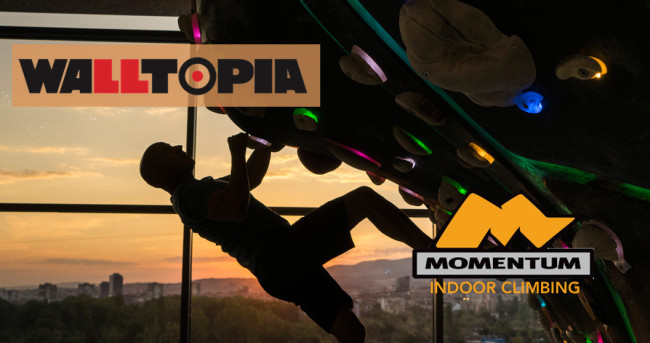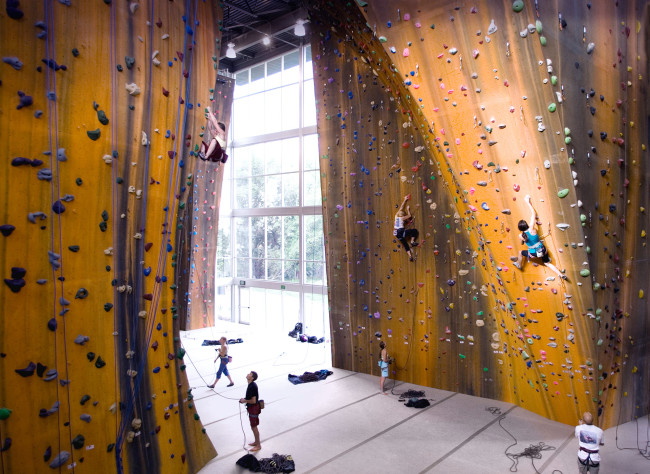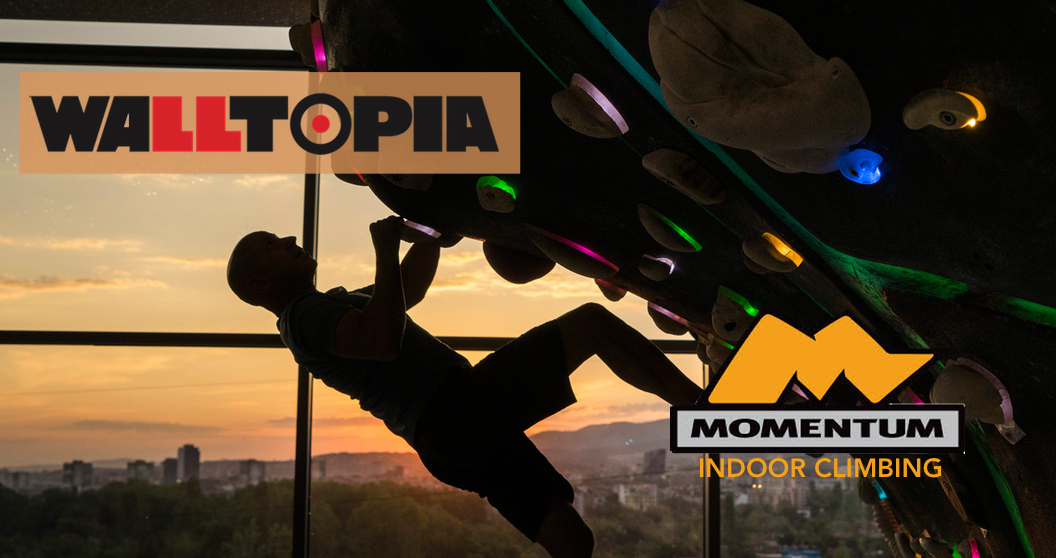
As established climbing gym operators look to expand the reach of their brands they are searching for partners that are aligned with their growth strategy. Also, they need partners with deep pockets that can invest in their multi-million dollar expansion projects.
Two companies that seem to have found that alignment is the Bulgarian climbing wall manufacturer Walltopia, and Salt Lake City-based climbing gym operator Momentum Indoor Climbing. These two companies will soon join forces when Walltopia finishes a major deal to buy equity in the expanding climbing gym company.
This is not the first time Walltopia has made an investment with one of their clients; they have interest in Sender One in Los Angeles, California, plus other gyms in Canada, Russia and beyond. For the most part these investments have been small and haven’t had any major implications for the industry as a whole. This new partnership with Momentum, however, may signal the start of a new era for the rapidly growing North American indoor climbing market.
Alignment
Walltopia was founded in 1998, but didn’t enter the US market until 2007, when they built the climbing walls at Momentum’s first facility in Sandy, Utah. The two companies continued a traditional client-contractor relationship for Momentum’s two other facilities in Utah, and Walltopia was also selected as the wall builder for Momentum’s latest project, a new climbing gym planned for Houston, Texas.
Despite Momentum’s steady growth, they are still a relatively small climbing gym operator. To continue growing in the competitive US market they found they needed outside investment from someone they trust. For Jeff Pedersen, the CEO and Founder of Momentum Climbing, Walltopia has earned that trust.
Since Pedersen met the charismatic CEO of Walltopia, Ivaylo Penchev, almost a decade ago at an outdoor retailer conference, the two executives have worked well together and have come to consider each other good friends.
This made the decision to take cash from Walltopia an easy one. “We have an aligned vision on how to grow the sport and we find it very easy to communicate and work together,” Pedersen told CBJ in a phone interview. “We’ve always been aligned even though we haven’t been connected in any formal way. And for whatever reason we see eye to eye on many things, it’s a good fit.”

This alignment is critical, as a large investment in Momentum could mean the founders have less autonomy in the direction of their company. This dilemma looms over any business looking to bring in outside investment; what is more important, growth or control? For Momentum, the answer, for now, is growth.
“The Momentum founders and owners have a decision to make and that is: would we rather retain control at the expense of slower growth, or are we willing to take some amount of risk that goes with the other path, and be able to seize opportunities that we see in front of us,” Pedersen said. “And I can tell you that it wasn’t difficult for me because I’m not actually trying to control anything … I’m just trying to create a network of gyms through strategic partnerships and I don’t know how I would do that by also being extra safe and keeping control over all aspects.”
Having a shared sense of synergy and the ability to leverage their collective skill sets is, for Pedersen, more powerful than any amount of funding. “Anyone that’s trying to grow their brand is looking at it that way,” he said. “People aren’t just looking for money, they’re looking for strategic value for the future.”
The final details of this investment deal are still being hammered out between the two companies and their attorneys, so the particulars, such as how large of an equity stake Walltopia is buying, are still unknown. Penchev indicated that the exact percentage wasn’t a key driver in Walltopia’s decision to invest. “It is possible that we will buy more than 50%, but in the end it’s not so important,” Penchev told CBJ in a Skype interview from Bulgaria. “We do not need control in Momentum. It depends mainly on them. We do not search for control. We do not want to manage such a business, otherwise we will lose our focus.”
Going Vertical
Vertical integration, where a firm invests in its upstream suppliers or downstream buyers, is not unusual in the larger business world, but in the climbing industry this type of deal is exceedingly rare. It has the potential to make a lot of money for those involved; It also could ruffle a lot of feathers. In an industry with only a few major climbing wall manufacturers, this partnership could make other climbing gym developers uncomfortable.
The most obvious downside for Walltopia is that gym developers may be cautious to hire a wall builder that is connected to another gym operator that might be a direct competitor. Developers almost always reach out to wall builders very early on in their planning process for a new location, before they have even finalized a real estate deal, and well before they publicly announce their project. There is concern that Momentum would have access to insider information about the expansion plans of climbing gyms around the world.
Another issue is the actual or perceived issue of preferential treatment for Momentum gyms. With a finite amount of engineers, project managers and installers, it’s not unreasonable for gym developers to worry that Momentum projects will always get the most qualified team, and priority treatment if there are delays.
Despite these issues, almost all the operators we talked to for this story are taking a wait-and-see attitude towards this deal.
In fact, Wes Shih, co-owner of Sender One, told CBJ he wasn’t concerned about Momentum getting preferential treatment. “I don’t anticipate this happening but if there ever comes a point where they were to put their own projects first in the cue of construction, well that’s different, we’ll go find someone else to build our walls,” he said. “But I don’t see that happening in the near future.”

When asked about these potential conflicts Penchev acknowledged that some Walltopia customers might have concerns about the deal, but seemed to wave them off with assurances that building walls would always be Walltopia’s priority. “We are manufacturer of climbing walls, Walltopia will always be manufacturer of climbing walls,” he said.
Walltopia as a whole and Penchev singly have invested in a wide array of companies across a mix of industries. Several climbing related companies, including climbing hold maker HRT and Safety Engineering, which specializes in safety equipment for indoor climbing facilities, as well as several others that specialize in adventure course products like Funtopia and Rollglider. There are also a number of companies connected to Penchev further afield from climbing, including the urethane lab Composite-X, a reverse auctions platform called Auxionize, and a ‘molecular quantum modeling’ company called Quantacea that is involved in the pharmaceutical industry.
But Penchev has no plans or desire to get into the business of operating climbing centers. He stated emphatically, “We do not want to run climbing gyms. This is not our business. We are ready to invest here and there if the opportunities are good, but we will not run climbing gyms.”
The fact that Walltopia does not want to operate climbing gyms is, for Penchev, sufficient proof that investing in Momentum is not a threat to other gym developers.
“So in fact, we are just investors,” Penchev said. “Yes, look, maybe someone will start to think of us as competitors. Some people, but they will fast understand that we are not competitors. I’m just not interested in managing climbing gyms. We do not have knowledge about this. We are not a company for managing climbing gyms. This is so clear to me. We will never start a business that we’re not experts in.”

Gym Building Machine
The climbing industry and climbing gyms in particular are experiencing a bull market and are looking to use whatever strategic assets they may have. Some gyms are pushing forward with a franchise model thinking they have solid operations that can be scalable, while others are hoping to gain a stronghold by saturating their local market.
Momentum is focusing instead on creating a superior development team and building the treasury to make their rapid growth possible. Walltopia and other investors are part of this team and have contributed to the company’s growing war chest. “We’re building a gym building machine,” Pedersen said. “We’re working very hard on the team and there’s a lot of hard work going into building systems, and building strategic partnerships that we think will allow us to move much more quickly in the near future.”
Part of that future is the entry into the potentially lucrative Texas market. Momentum announced plans to open a large facility in the tony suburb of Katy, on the Northwest edge of Houston, sometime in 2016. In their 3-year strategic plan they hope to build 15 – 20 new climbing facilities across the US, potentially becoming the first ‘nationwide’ climbing brand.
By teaming up with Penchev and tapping not just into the Bulgarian’s wallet, but also his strong executive skills, Pedersen hopes to move Momentum forward much more quickly than before. “Ivaylo is really fast, and that’s part of why he’s successful. A lot of times, many times, I wish I was that fast, but I’m just not and my company isn’t,” Pedersen lamented. “We are trying to build our brand quickly and take advantage of opportunities that we see, but we’re a bunch of rock climbers and by nature, we think very carefully about what we’re doing.”
In a recent Bloomberg Business article profiling Penchev and the companies he and Walltopia co-founder Metin Musov have created, Penchev describes himself as a serial entrepreneur. As opposed to many business professionals, he is more honest about this capitalistic side of himself and why he does it. “Maybe this is greed. I don’t know what this is. It’s greed and fun,” he said.
Greed and fun will get a person only so far in business, but Penchev also believes in helping others. This is good news for Pedersen and the rest of the Momentum team.
“As a young man, only my personal achievements used to make me happy. Now it’s not like this. I am old man now,” the 45 year old Penchev said. “I am a little bit wiser than before. I am not ruled by my penis anymore so much. Not primarily by my penis,” he laughed. “I consider people from Momentum as friends. When Momentum makes a success, I will feel I am part of this success. This type of satisfaction is more and more important to me lately. I enjoy when I help some of the people to achieve something.”
This article has been edited to clarify Walltopia’s subsidiaries and Penchev’s personal investments.

Climbing Business Journal is an independent news outlet dedicated to covering the indoor climbing industry. Here you will find the latest coverage of climbing industry news, gym developments, industry best practices, risk management, climbing competitions, youth coaching and routesetting. Have an article idea? CBJ loves to hear from readers like you!






